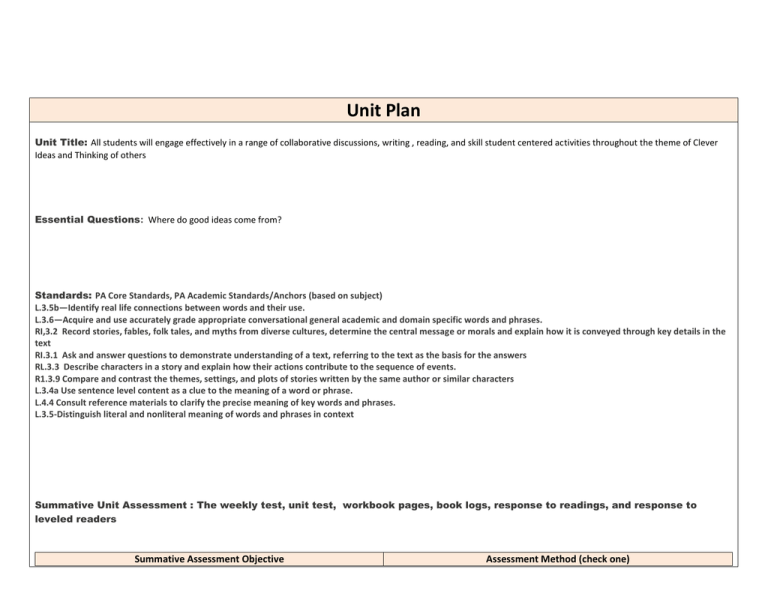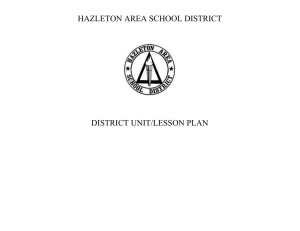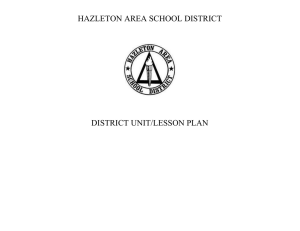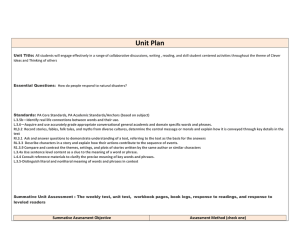Unit Plan
advertisement

Unit Plan Unit Title: All students will engage effectively in a range of collaborative discussions, writing , reading, and skill student centered activities throughout the theme of Clever Ideas and Thinking of others Essential Questions: Where do good ideas come from? Standards: PA Core Standards, PA Academic Standards/Anchors (based on subject) L.3.5b—Identify real life connections between words and their use. L.3.6—Acquire and use accurately grade appropriate conversational general academic and domain specific words and phrases. RI,3.2 Record stories, fables, folk tales, and myths from diverse cultures, determine the central message or morals and explain how it is conveyed through key details in the text RI.3.1 Ask and answer questions to demonstrate understanding of a text, referring to the text as the basis for the answers RL.3.3 Describe characters in a story and explain how their actions contribute to the sequence of events. R1.3.9 Compare and contrast the themes, settings, and plots of stories written by the same author or similar characters L.3.4a Use sentence level content as a clue to the meaning of a word or phrase. L.4.4 Consult reference materials to clarify the precise meaning of key words and phrases. L.3.5-Distinguish literal and nonliteral meaning of words and phrases in context Summative Unit Assessment : The weekly test, unit test, workbook pages, book logs, response to readings, and response to leveled readers Summative Assessment Objective Assessment Method (check one) Students Will be able to comprehend the story “Experts” and understand the genre realistic fiction. The children will be able to define, give example, and ask a question for the vocabulary words. ____ Rubric ___ Checklist ____ Unit Test ____ Group _x___ Student Self-Assessment __x__ Other (explain) vocabulary word cards, reading responses Teacher Name : 4th Tracy Wisdo Subject : ELA Proposed Dates: September 29 Grade Level (s) Building : WHEMS Day Objective (s) Students will-understand the vocabulary using the context and be able to give examples. DOK LEVEL 1, 2 Demonstrate vocabulary cards Give examples in sentence. Retell the story. Respond to the story 1 2 Activities / Teaching Strategies Grouping DAILY PLAN Whole Differentiated Materials / Resources Visual vocabulary cards Journals Workbook vocabulary page Assessment of Objective (s) Formative discussion- Summative- graphic organizer Student Self - Assessmentresponse to reading Vocabulary examples Small group discussion Students will-be able to describe in depth a character, setting, or event in a story or drama, drawing on specific details in the text. 1,2 Read story. Read teacher read aloud Respond to reading Use graphic organizer Whole differentiated Graphic organizer Workbook page computers Formative-workbook page Graphic organizer Summative- comprehension questions Student Self - Assessment- oral discussion, center skills 3 Students will-demonstrate understanding of figurative language, word relationships, and word meanings. 1,2 Workbook page Use spelling visual cards to go over the short vowels Write about the reading—write an analysis Whole differentiated Workbook page Spelling visual cards Formative-workbook page Summative- analysis about the reading Student Self - Assessment-oral discussion, center skills 4 5 Students will- be able to use combined knowledge of all letter sound correspondences, patterns, and read accurately unfamiliar multisyllabic words in context and out of context. 1,2 Students will-be able to use concrete words and phrases and sensory details to convey experiences and events precisely. 1,2,3 Use spelling cards Do workbook page Do Spelling handout Journals—go over proofreading Whole Differentiated paired Spelling cards Workbook page Journals computers Formative-worksheet, journal Summative- workbook page Student Self - Assessmentdiscussion with groups Write a response to the reading. Go over daily language proofreading Go over the guided readers with the questions. Respond to the guided readers. Give weekly spelling test. Whole Differentiated paired Daily language proofreading Guided readers Formative- guided reader responses Summative- spelling test Student Self - Assessmentproofreading their daily language


